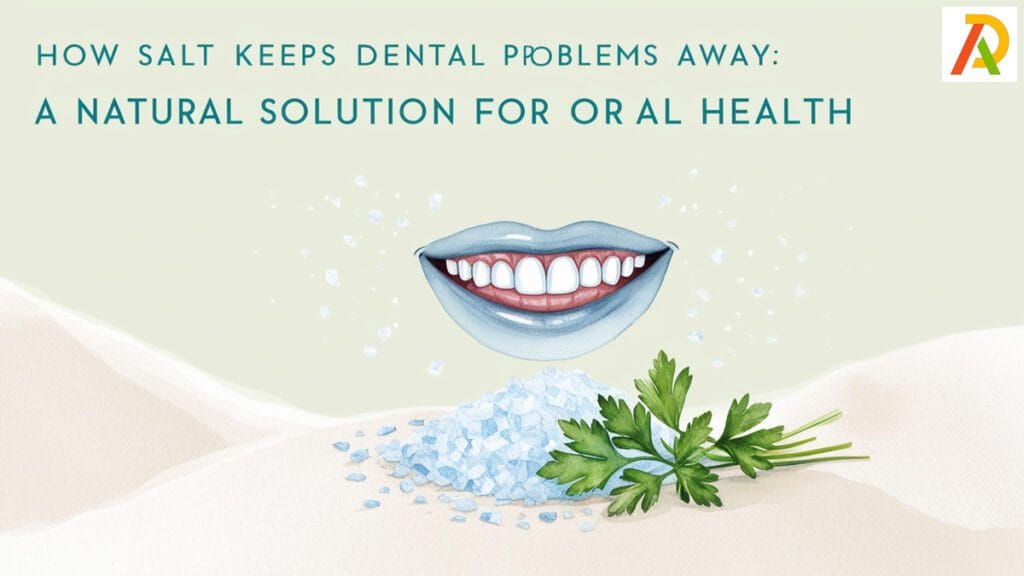Western Dental – How Salt Keeps Dental Problems Away

One of the earliest and most proven treatments for mouth-related problems was salt. A proven antibacterial, antiseptic, healing substance, its antibacterial role gives an essential defense against dental illness. Many individuals have exploited this resource for centuries, from basic salt rinse applications to commercially manufactured salt-embedded toothpaste to enhance oral cleanliness. Even today, salt remains an effective all-natural additive for the general well-being of mouth-related health. This article exploreshow western dental problems can be cured by salt; its benefits for oral care, and practical ways to incorporate it into your dental hygiene routine.
Western Dental: Why Oral Health Matters
Oral health is not just about your smile; it impacts your overall health. Bad oral hygiene can cause tooth decay, gum disease, and bad breath, raising your risk for severe conditions such as heart disease and diabetes. Good oral hygiene through brushing, flossing, and regular visits to the dentist are essential. Natural remedies like salt can complement these practices by providing additional benefits to keep your teeth and gums in shape.
Salt can fight bacteria, reduce inflammation, and help heal. Therefore, it has become a helpful ally in oral care. Let’s explore how salt keeps dental problems away and why it remains an effective solution for maintaining a healthy mouth.
Role of Salt in Oral Health ( Western Dental )
Salt is not only a food seasoning but also has many benefits for oral hygiene. It contains natural minerals such as calcium, magnesium, and potassium, essential for healthy teeth and gums. Salt also has powerful antibacterial and antiseptic properties that can help prevent and treat common dental problems. Understanding how salt keeps dental problems away can help you incorporate it effectively into your daily routine.
Types of Salt and Their Unique Benefits for Oral Health
The typical household salt is table salt. Although less mineral-rich than other salts, it can still provide antibacterial and cleansing benefits for oral health.
- Himalayan Pink Salt contains over 80 trace minerals and is rich in calcium and magnesium, contributing to the well-being of teeth and gums. It also undergoes less processing than regular table salt, making it gentler for oral hygiene.
- Sea Salt: Harvested from seawater, sea salt contains minerals such as magnesium and calcium. Its natural antibacterial properties reduce bacteria and inflammation in the mouth.
- Epsom Salt: Although not taken internally, Epsom salt can be used as a mouth rinse to decrease inflammation and reduce gum tissue. It contains magnesium sulfate, which is healing.
How Salt Prevents Common Dental Issues: Understanding Western Dental Prevention
Salt is an excellent natural remedy for oral health. It can neutralize bacteria, reduce inflammation, and heal the body, helping to prevent several common dental issues.
Tooth Decay and Cavities
Tooth decay occurs when acids produced by bacteria in the mouth break down the enamel of the teeth, eventually forming cavities.
How Salt Helps: Salt reduces the number of harmful bacteria that contribute to tooth decay. It also neutralizes the acids in the mouth, making it less acidic and reducing the risk of enamel erosion. A regular saltwater rinse can help prevent plaque buildup and decay, demonstrating how salt keeps dental problems away naturally.
Gum Disease (Gingivitis and Periodontitis)
Gum disease can take the shape of gingivitis, inflammation, and redness resulting from an elevated plaque level. Unless cured, gingivitis evolves into periodontitis, a hazardous disease involving gum problems in the advanced phases that often contributes to losing several teeth.
Salt also has natural antibacterial and anti-inflammatory properties. It helps kill bacteria that cause gingivitis and periodontitis. Saline rinses can also relieve swollen gums by promoting healing so that the disease does not worsen and the gum tissue is not further damaged.
Halitosis (Bad Breath)
Bad breath results from bacteria. In this case, bacteria thrive on food particles in the mouth and produce sulfur compounds responsible for the stench.
It helps by destroying odor-causing bacteria in our mouths. Creating more alkaline conditions reduces the rate of acid formation, inhibiting bacterial growth. Regular salt water rinses help clear our lousy breath and leave our mouths fresh.
Plaque and Tartar Buildup
Plaque is a sticky film of bacteria that accumulates on the teeth. It hardens to become tartar, which cannot be removed without a dentist’s help.
How Salt Works: Salt is abrasive. It scrubs off plaque from the teeth before it can turn into tartar. Salt kills the bacteria responsible for plaque, lowering the chances of plaque formation and tartar.
Salt as an Antiseptic: How Salt Keeps Dental Problems Away in Oral Healing
Salt is an excellent antiseptic. Therefore, it heals mouth sores, cuts, and other oral injuries by killing bacteria, drawing out toxins, and speeding up the healing process.
- Mouth Sores: Salt helps alleviate the pain and inflammation from canker sores. It kills bacteria that might be causing the pain to increase, and the sores heal quickly.
- Healing After Dental Procedures: After oral surgical procedures such as extractions and surgeries, a saltwater rinse is the best treatment to use by many dentists. It heals wounds better because salt prevents infections from spreading into the tissues. Therefore, tissues heal faster.
- Swollen Gums: Saltwater rinse heals inflamed swollen gums associated with gum diseases and irritations. Swelling reduces the infection, causing organisms’ populations to decrease rapidly, and heals tissue quickly.
These healing benefits further prove how salt keeps dental problems away while aiding recovery.
Read: how to deal with teeth-gap
How to Use Salt for Oral Health
Using salt in your oral care routine is simple and effective. Here are a few ways to use salt for dental health:
Saltwater Rinses: A Simple Solution
One of the easiest ways to experience how salt keeps dental problems away is through a saltwater rinse. It helps cleanse the mouth, reduce bacteria, and soothe irritation.
How to Make a Saltwater Rinse:
- Dissolve 1/2 to 1 teaspoon of salt in a glass of warm water.
- Stir until the salt is dissolved completely.
- Swish the solution around in your mouth for 30 seconds to 1 minute.
- Spit it out and rinse it with plain water.
- Do this saltwater rinse once or twice daily for optimal results.
Salt and Baking Soda Toothpaste
This natural toothpaste from salt and baking soda effectively cleans, reduces plaque formation, and gives you fresher breath.
How to make Salt and Baking Soda Toothpaste:
- Combine one teaspoon of salt and one teaspoon of baking soda.
- Add water to form a paste.
- Use the mixture for brushing your teeth for 2 minutes.
- Use the mixture once or twice a week to avoid abrasive ingredients.
Salt inclusion in the diet
Healthy minerals involved in the diet, such as calcium and magnesium, help support healthy oral conditions. Hydration from excessive salt is usually a result of too much salt in the body. Moderate salt consumption as part of a balanced diet will help promote healthy gums and teeth.
The Science behind How Salt Keeps Dental Problems Away in Western Dental
Salt maintains oral health through its alteration of the environment of the mouth to be less conducive to harmful bacteria. Through its antibacterial properties and ability to regulate pH and minerals, salt works together to combat common dental issues.
1. Antibacterial Properties: How Salt Eliminates Harmful Bacteria
Bacteria thrive in moist environments, feeding on food particles and producing acids that lead to cavities and gum disease. Salt disrupts this process through osmosis, a natural mechanism whereby salt draws water out of bacterial cells, dehydrating and killing them. This reduces plaque formation, prevents infections, and helps maintain a cleaner mouth. This is one way how salt keeps dental problems away, mainly when used in regular oral care routines.
Also, salt prevents anaerobic bacteria from growing, which are responsible for the stinky, lousy breath. By reducing bacterial colonies, salt freshens breath naturally and prevents compounds that cause the odor.
2. pH Regulation: Creating a Less Acidic Oral Environment
Highly acidic mouths lead to enamel erosion and facilitate bacterium growth. Pathogenic bacteria, including Streptococcus mutans, thrive in a low-pH environment and produce more acid when they break down food. Salt is neutral to acids because it raises the pH of saliva, making the environment unfavorable for bacteria. Healthy pH balance zones strengthen the enamel by reducing cavities and gum diseases.
3. Mineral Content: Reinforce Teeth and Gums
Certain salts, such as Himalayan pink salt and sea salt, contain essential minerals such as:
- Calcium: Helps strengthen the enamel and prevents tooth demineralization.
- Magnesium: Aids in the health of gums and prevents inflammation.
- Potassium: Maintains the structure of the teeth by preventing enamel softening.
Precautions: Salt in Moderate Amounts
While salt has numerous oral health benefits, it must be used in moderation. Here are a few things to keep in mind:
- Enamel Erosion: Overuse of abrasive substances like salt can wear down enamel. To avoid enamel erosion, limit salt-based toothpaste or rinses to occasional use.
- High Sodium Intake: Too much sodium can cause high blood pressure and other similar health conditions. A healthy diet and lifestyle will balance salt intake.
- Dry Mouth: Excessive amounts of salt cause dehydration and reduce salivary activity, increasing the likelihood of dry mouth and tooth decay. Stick to water for hydrating your mouth.
Salt in Modern Oral Health: How Salt Keeps Dental Problems Away
Even if salt dates long, it remains a much-used agent in modern practice. Many modern dental procedures and dental care products find inspiration in salt’s properties. Here’s how salt keeps dental problems away and continues to serve a critical role in contemporary oral care:
Salt in Professional Dental Care
Many dentists suggest that patients rinse with salt water after specific procedures, such as tooth extractions, dental surgeries, or deep cleanings. Saltwater helps prevent infection and speeds up the healing of oral tissues.
Salt is also an ingredient in some dental care products, such as mouthwash and toothpaste. Most of these products use salt and other ingredients to enhance their antibacterial and healing properties.
Natural Alternatives to Conventional Toothpaste
This is why most people are opting for homemade toothpaste recipes. Some of the most common ingredients in these recipes include baking soda, coconut oil, and salt. These ingredients help clean teeth and kill bacteria naturally. When used in the right proportions, natural toothpaste can be as effective as commercial products without the chemicals and additives found in most commercial options.
Salt in Oral Hygiene for Sensitive Teeth and Gums
Salt can be a gentle and soothing way to address discomfort for people with sensitive teeth or gums. Saltwater rinses are often recommended for people with inflamed or swollen gums, as the salt can relieve irritation without causing further sensitivity.
Salt’s action is gentle yet effective. Therefore, it is suitable for individuals who feel discomfort caused by other mouth care products. It maintains balance in the mouth, which results in less irritation and initiates healing and cleansing simultaneously, showing how salt keeps dental problems away in those with delicate oral health.
Role of Salt to Prevent Dry Mouth
Dry mouth, or xerostomia, is a condition in which the salivary glands fail to produce enough saliva. This often results in difficulty talking, swallowing, or even eating, as well as increased susceptibility to tooth decay and gum disease. Salt is a natural remedy for dry mouth.
How Salt Helps Prevent Dry Mouth
Salt helps to keep the mouth’s fluids balanced, stimulating hydration and increasing saliva production. Saltwater rinsing or simply using salt in the diet will help prevent the embarrassing symptoms of dry mouth, like a sticky sensation or increased susceptibility to cavities.
Saliva protects oral health naturally because it washes away food particles, neutralizes acids, and contains enzymes that break down bacteria. Salt helps maintain this balance by encouraging the natural production of saliva, ensuring that your mouth stays hydrated and free of harmful bacteria.
Salt and Remineralization of Teeth
Remineralization is a natural process in which minerals like calcium and phosphate are redeposited into the tooth enamel after being lost through acid erosion. It reverses the early stages of tooth decay and strengthens enamel.
While fluoride is the most recognized agent in the remineralization process, salt can also contribute. Saltwater provides a conducive environment for remineralization, facilitating the remineralization of minerals in teeth. Calcium and magnesium in some salts, such as Himalayan pink salt, help strengthen enamel and prevent further decay.
How Salt Aids in Remineralization
The minerals in salt complement the natural minerals in the mouth. Salt maintains an alkaline environment within the mouth, which encourages the deposition of calcium and phosphate into the enamel for healthy teeth. Regular saltwater rinses or brushing with salt can support this natural process and prevent cavities and erosion of the enamel.
Salt’s Role in Fighting Oral Cancer
Oral cancer is a serious condition that affects the mouth, lips, gums, and tongue. Salting does not prevent oral cancers, but its properties may help with early detection and treatment.
Saltwater Rinses as Preventive Measure
Healthcare providers often advise rinsing the mouth to eliminate infections as one of the primary treatments for oral cancer for several patients. Salt’s antibacterial and anti-inflammatory qualities will reduce swelling and minimize the risk of infection, so quicker healing occurs in the affected parts of the oral cavity.
While regular oral care with salt may reduce the risk of infections, oral cancer requires medical treatment and early detection. If you notice persistent sores, lumps, or unusual changes in your mouth, seeking professional dental care and consultation is crucial.
Salt: An Addition to a Wholesome Oral Care Practice
Salt is an excellent addition to your oral hygiene practice but remains part of a broader holistic approach to oral care. Oral health is best achieved through products and practices that promote, outside of these, healthy lifestyle habits that contribute to a healthy mouth.
Holistic Practices to Maintain Healthy Teeth and Gums
- A balanced diet should include more fruits, vegetables, and whole grains high in vitamins and minerals. Foods rich in vitamin C maintain healthy gums, and calcium-rich foods enhance bone strength.
- Regular Brushing and Flossing: Although salt contains an antibacterial ingredient, oral hygiene practices such as brushing with fluoride toothpaste and flossing are essential. Salt is used against bacteria as an additional aid, but not at the cost of neglecting regular brushing.
- Hydration: Hydrate throughout the day. This will keep the mouth hydrated like the rest of the body. Hydration supports saliva production in the mouth, safeguarding teeth and gums from bacteria.
- Avoid Sugary Foods: The presence of high sugar levels causes tooth decay because bacteria find the sugars and produce an acid that destroys the enamel of the teeth. Few sugary snacks or beverages reduce the chance of having healthy teeth and gums.
Conclusion
Salt is a powerful yet affordable natural remedy that can enhance your oral hygiene routine and help prevent dental problems. Whether through saltwater rinses, salt and baking soda toothpaste, or its role in remineralizing teeth and soothing swollen gums, salt plays a vital role in supporting oral health.
While it shouldn’t replace the regular dental visit or fluoride toothpaste, salt can be an excellent addition to a well-rounded oral care routine. With its use in moderation and conjunction with other healthy habits, you can enjoy many of the benefits of this ancient yet highly effective ingredient for your teeth and gums. By using salt correctly and in moderation, you can experience firsthand how western dental salt keeps dental problems away and enjoy a healthier, cleaner mouth. Remember, a good smile comes from looking pretty with healthy gums and healthfully maintained so your entire body thrives.
Read on dental implants


